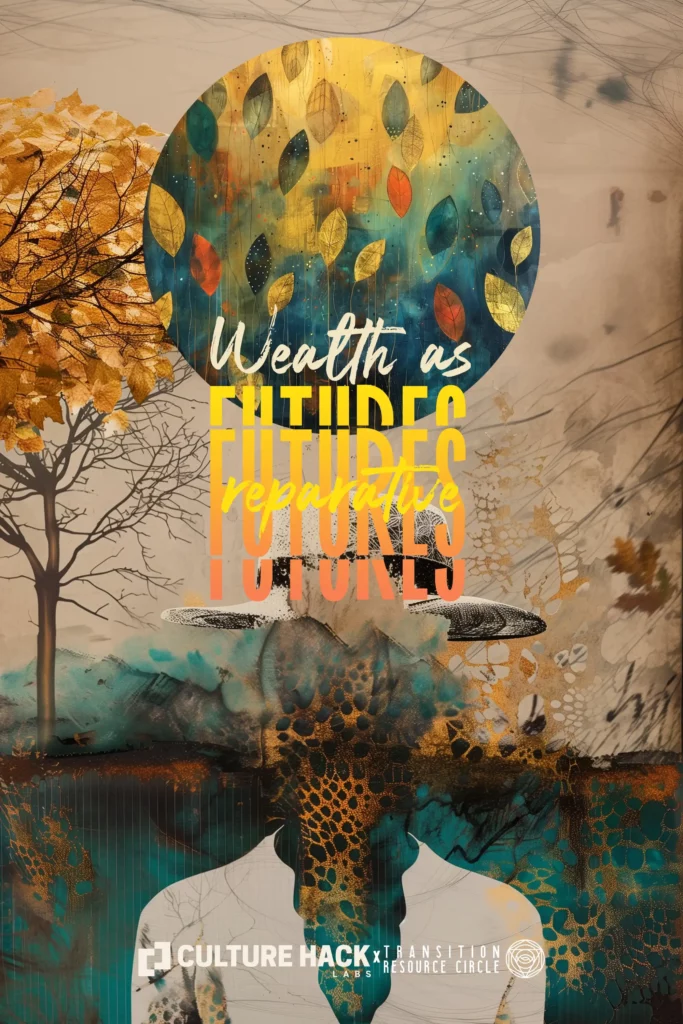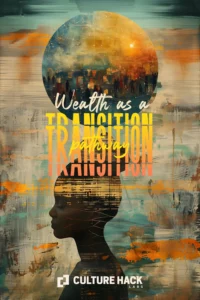Transitioning Wealth: An inheritor’s call for reparative futures
In this reflective essay, funder-activist Justine Epstein explores the moral and spiritual implications of inheriting wealth in the context of late-stage capitalism and ecological collapse. Through intimate storytelling and deep introspection, Epstein navigates themes of privilege, accountability, and the pursuit of reparative actions, inviting us to contemplate the possibilities of healing, liberation, and reshaping wealth for a more just and equitable future.

This article was written for Kosmos Journal and also appears in the May issue, ‘Healing Wealth‘.
These are the questions that I am asking myself as a white wealth inheritor in the times of late-stage capitalism and ecological collapse:
What happens to a psyche, to a soul, to a people acculturated into thriving on the suffering, abuse, and extraction of others?
At what moral and spiritual cost has come to those of us beneficiaries of systems built on violence?
What are the futures we enable when we do not face the truth of what has created this present meta-crisis?
What possibilities emerge when we open to the truth of who we are and how we got here, and allow ourselves to be transformed through the process of reckoning?
Who am I, who are my people, on the other side of whiteness and wealth accumulation?
After capitalism, what will be the stories we tell about who we were, and who we’ve become? And what is the role of wealth to get from here to there?
These questions haunt me. They crack me open. They beckon me to dare to imagine the futures that are calling out to be born. They ask me to tell the truth.
The truth is, at 18 years old, I began to receive access to a multi-million dollar inheritance. It was not a surprise to me, as my parents had chosen to normalize the topic of money with me and my brother at a young age. Yet even as a child, I could feel the dynamics of power amidst my classmates, in our neighborhood, with the people (often people of color, often immigrants) who came to clean our home, tend our garden, and care for us. I could feel the contradictions between what my family told me – it’s okay to talk about money, we have it, this isn’t something to be ashamed of or hide – and the unspoken cultural agreement I simply understood: maintain silence. It was thick in the air.
The money came from my father’s side of the family from a company founded by an ancestor six generations ago, now one of the world’s largest multinational publicly traded corporations. The wealth in my name is now housed and grown through a mixed portfolio of investments at a private wealth management office in a tangle of trusts, agreements, laws, and jargon that was set up to grow wealth in my family for generations to come. I was told, be grateful.
While I understand that as an individual I cannot claim to have created these systems of exploitation, I also cannot deny my complicity within them, both ancestrally and financially, and thus my responsibility to grieve, reckon, and reach towards the adjacent possibilities of healing, liberation and repair.
Writing this today, offering a glimpse into my unfolding orientation to money, wealth, reckoning and healing in a public way, I feel the voices telling me to keep quiet, to simply allow the system that has been working for my benefit to continue doing its job. I feel my belly tighten with the vulnerability of opening my mouth to question that system that has offered so much material power and privilege to myself and my family.
This speaking out is for me a choice – and also not a choice. I must weigh what is at stake in my silence: forests disappearing, oceans rising, bombs extinguishing entire families, languages and histories evaporating, children locked up, labor stolen for profit… While I understand that as an individual I cannot claim to have created these systems of exploitation, I also cannot deny my complicity within them, both ancestrally and financially, and thus my responsibility to grieve, reckon, and reach towards the adjacent possibilities of healing, liberation and repair.
I began to be called by my friends and community members, and called into movements such as Stand with Standing Rock and Black Lives Matter, to look more deeply at both the legacies of my ancestors and also of the wealth in my name: to question it, to wrestle with it, to interrogate it, to understand it, and most importantly, to find ways to move it towards what my Jewish ancestors called tikkun olam, repairing the world.
I have found my map to this work in finding, learning and carrying the stories of my ancestors – a practice that poet and movement elder Aurora Levins Morales calls raícism. In the essay “Embracing Rootedness and Radical Genealogy” she writes, “Raícism, or rootedness, is the choice to bear witness to our specific, contradictory historical identities in relationship to one another. It is an accounting of the debts and assets we have inherited, and acknowledging the precise nature of that inheritance is an act of spiritual and political integrity.”
Through raícism, I come to understand that my lineage is not just one thing. It is a braid of stories that is both about hoarding wealth built off of extraction and about people doing their best to care for and provide for their families. It is both about dehumanization (a great-grandfather was involved in the eugenics movement in the early 1900s) and about care (the same great-grandfather began a movement in reproductive rights that has empowered hundreds of thousands of women around the world). Yes, my ancestors are early colonizers in Massachusetts, they were eugenicists, perhaps enslavers. My ancestors are also Jewish Yiddish-speaking shopkeepers, Irish working-class train conductors, abolitionist judges who opposed the Dred Scott decision. I have so much to learn from my people – from their mistakes and their crimes, and also from their love, their creativity, their dreams and their sacrifices.
All these stories and their implications are not to be held alone. Communities like Resource Generation, Solidaire Network, and the Transition Resource Circle have been critical for rooting me in context and relationship. These comrades have rigorously and lovingly deepened my political analysis of the intersecting systems of domination, exploitation and separation and supported me to understand my story within a larger context of injustice that is both a moral imperative to repair and an invitation to heal. They have helped me recognize that together we can be part of a powerful grassroots social movement ecosystem organizing for justice, liberation, and remembering our human place with the earth again. Above all, these intergenerational, international, multi-racial, cross-class friendships are the ones I can lean on when it all feels impossible to hold alone. The more I surrender into deep, real, and honest relationships with those whose liberation is bound up in my own, and to the Earth, the more I trust in the person I am becoming, and the more I can let go — of money, of control, and the need to have it all figured out.
For years I wanted to hide from the money and the ancestral stories of harm, to bask in the ignorance of simply not understanding it, and leaving it be. Even in turning towards my ancestors and money, I cannot pretend that disentanglement with my inheritance is complete or straightforward. I have not given all the money away (yet) and sometimes crave, and sometimes surrender to the luxuries that this wealth offers — the phone, the car, the travel, the choice to learn, or work, or rest. Beyond narratives of moralism or redemption, I still find pleasures in the wealth, and gratitude for it, amidst the grief. I am learning to let them co-exist in a generative paradox – one that calls me, and my people, into something more fertile. I am learning to sink my roots, and reach.
My commitment is to stay with the trouble, with the wound, with the monsters and wonder into what kind of imperfect redemption might be sought for my lineage, for the futures of my descendants, beyond the conceptions of power and wealth we have been taught to accept as the only way.
As I allow this inheritance to begin to flow in creative and responsive ways towards land rematriation, reparations movements, grassroots organizing, mutual aid, and the many forms of community-based experimentation towards post capitalist futures, I am discovering that the praxis of healing wealth and surrendering control requires the utmost humility. It requires me to know, love and trust myself, and not take myself so seriously. It requires that I offer myself grace that the world around me might not. It requires joy, laughter, song and dance. It requires rituals, community, long walks, and critical conversations. It requires the reminder again and again that the definitions of wealth are not static – they are cultural, and therefore, everchanging. And it is time to engage in deep cultural renewal, remembering, and the redefinition of wealth through reparative actions that alchemize and transform wealth and the people who hoard it.
As the systems we have known collapse around us, I am asking:
What is ready to die?
What are the ceremonies and rituals of initiation we need to accompany us into this time of hospicing?
What is the Earth asking of us?
What shapes will our bodies, our relationships, our economies take as we surrender, as we remember, as we disintegrate, as we transform?
What is being born?
Where are we going?
Are you coming with me?
Justine Epstein apprentices her longing for liberated post capitalist futures as an organizer, facilitator, rites of passage guide, mentor, naturalist, and lover of birds and wild things. She co-facilitates the Ancestors & Money Cohort – most recently as a class at Stanford University – and offers 1:1 mentoring on the same topics.
